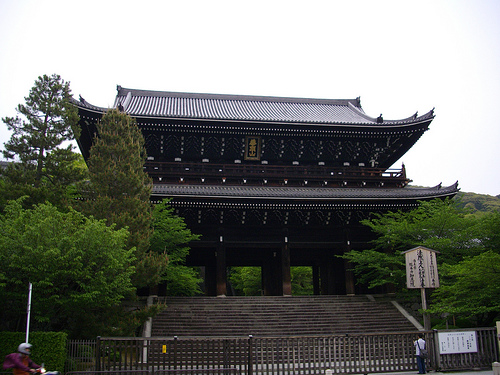Difference between revisions of "Chion-in"
From SamuraiWiki
Jump to navigationJump to search| Line 6: | Line 6: | ||
Originally founded in [[1234]], the entire compound was rebuilt in the 1630s, under the patronage of Shogun [[Tokugawa Iemitsu]]. The hollyhock crest of the [[Tokugawa clan]] can be seen on the ends of many of the roofbeams. | Originally founded in [[1234]], the entire compound was rebuilt in the 1630s, under the patronage of Shogun [[Tokugawa Iemitsu]]. The hollyhock crest of the [[Tokugawa clan]] can be seen on the ends of many of the roofbeams. | ||
| + | |||
| + | Foreigners were allowed to stay overnight at the temple during the [[Meiji period]]; prominent travelers who did so included Mr. and [[Isabella Stewart Gardner|Mrs. Jack Gardner]] of Boston. | ||
{{stub}} | {{stub}} | ||
| + | |||
| + | ==References== | ||
| + | *Plaques on-site. | ||
| + | *Philip Hendy. ''Catalogue of European and American Paintings in the Isabella Stewart Gardner Museum''. [[Isabella Stewart Gardner Museum]], 1974. | ||
[[Category:Temples]] | [[Category:Temples]] | ||
[[Category:Kamakura Period]] | [[Category:Kamakura Period]] | ||
Revision as of 01:16, 26 December 2012
- Established: 1234
- Japanese: 知恩院 (Chion-in)
Chion-in, in Kyoto, is the head temple of the Pure Land Sect of Buddhism. The main gate of the temple is the largest in the country of that particular type or style.
Originally founded in 1234, the entire compound was rebuilt in the 1630s, under the patronage of Shogun Tokugawa Iemitsu. The hollyhock crest of the Tokugawa clan can be seen on the ends of many of the roofbeams.
Foreigners were allowed to stay overnight at the temple during the Meiji period; prominent travelers who did so included Mr. and Mrs. Jack Gardner of Boston.
References
- Plaques on-site.
- Philip Hendy. Catalogue of European and American Paintings in the Isabella Stewart Gardner Museum. Isabella Stewart Gardner Museum, 1974.
